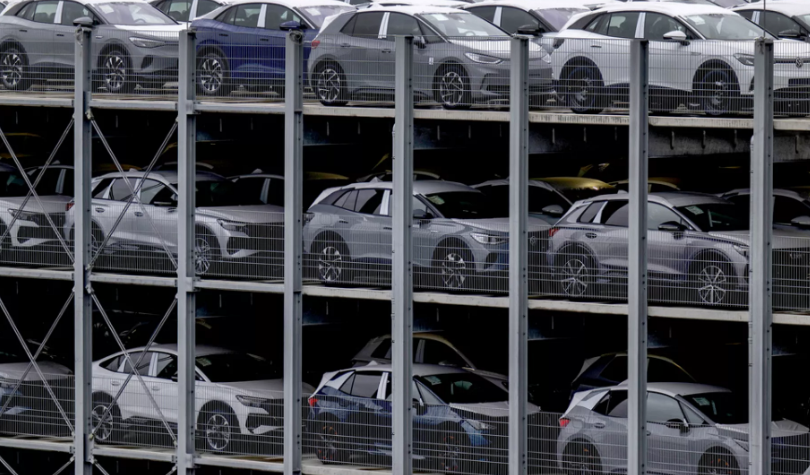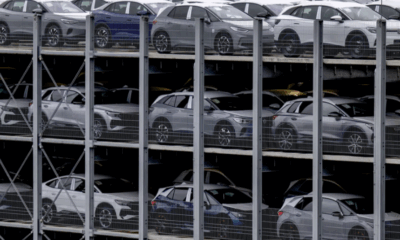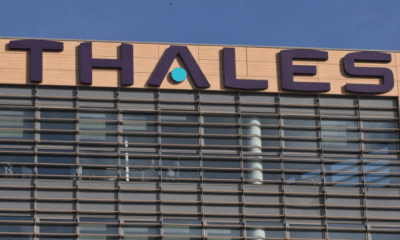Business
UniCredit Launches €10.1bn Bid for Banco BPM Amid Rising European Bank Mergers
Business
Strong Demand for Nintendo Switch 2 Pre-Orders Met With Chaos, Potential Tariff Concerns

Pre-orders for the Nintendo Switch 2 opened in the United States early Thursday and sold out within minutes across major retailers, highlighting massive consumer interest ahead of the console’s official launch on June 5. However, market experts warn that rising geopolitical tensions and new U.S. tariffs on Chinese imports could soon push prices even higher for electronics like gaming consoles.
Retailers including Best Buy, Target, Walmart, and GameStop experienced a surge of traffic overnight, with many customers reporting technical glitches, long wait times, and canceled orders. Listings for the new console — priced at $449.99 (€396.6) — appeared as “out of stock” or “unavailable” within minutes of going live.
GameStop, which offered both online and in-store pre-orders, confirmed overwhelming demand had temporarily disrupted its website. “We’re seeing overwhelming demand for Switch 2, which is causing some site issues,” the company posted on X, formerly known as Twitter. The retailer added it would work to remove duplicate or bot orders to reopen availability, though online inventory was already depleted by Thursday afternoon.
Nintendo acknowledged the “very high demand” and said it is working to fulfill orders through its My Nintendo Store, but warned that delivery by the June 5 launch date is not guaranteed. “The excitement around this online pre-order was incredible,” Walmart said in a statement, confirming that its stock had also sold out quickly.
Pre-orders were initially scheduled for April 9 but were delayed amid growing concerns over new U.S. tariffs. Nintendo cited the need to “assess the potential impact of tariffs and evolving market conditions” before proceeding.
The timing of the Switch 2’s release comes as the electronics industry faces potential price volatility due to trade tensions. President Donald Trump’s decision to implement new tariffs on Chinese goods, combined with retaliatory measures from China, has raised fears of price hikes on a broad range of consumer electronics. Economists warn that gaming consoles could be among the products most affected, given their reliance on international supply chains.
While the new features of the Switch 2 — including a larger screen, interactive chat, and new game titles — justify part of the price increase from the original Switch’s $299 (€263.5), analysts believe tariffs have also contributed to the higher cost.
Nintendo is counting on the Switch 2 to revitalize hardware sales as demand for the original console slows. In February, the company reduced its full-year sales forecast for the Switch to 11 million units, down from an earlier projection of 12.5 million.
With pre-orders now closed, customers will have another opportunity to purchase the Switch 2 on June 5, when it officially hits stores.
Business
Alphabet Stock Surges After Strong Earnings Driven by Google Search and Cloud Growth

Shares of Alphabet Inc. soared nearly 5% in after-hours trading Thursday following a strong first-quarter earnings report that beat Wall Street expectations. The tech giant, parent company of Google and YouTube, saw robust growth in its core Google Search advertising business, while Google Cloud recorded a sharp increase in profitability, bolstering investor confidence.
Alphabet reported total revenue of $90.2 billion, marking a 12% increase from the same period last year and surpassing analysts’ forecasts of $89.12 billion. Search advertising remained the company’s largest revenue contributor, bringing in $50.7 billion—a 9.8% year-on-year rise.
Google Cloud, the company’s fastest-growing segment, posted $12.3 billion in revenue, up 28% from a year earlier. While the figure came in slightly below market expectations, operating income more than tripled to $2.18 billion, signaling that Alphabet’s substantial investment in AI infrastructure and cloud technologies is paying off. Chief Financial Officer Anat Ashkenazi noted that demand for cloud services continues to exceed available data center capacity, prompting plans for $75 billion in capital expenditures this year.
CEO Sundar Pichai credited the results to Alphabet’s integrated AI strategy. “We’re pleased with our strong Q1 results, which reflect healthy growth and momentum across the business,” he said in a statement. “Underpinning this growth is our unique full stack approach to AI.”
Alphabet also announced a $70 billion share buyback plan and a 5% dividend hike, lifting its quarterly dividend to $0.21 per share. Despite Thursday’s gains, Alphabet’s stock remains down 16% for the year, impacted by broader tech-sector selloffs linked to tariff concerns.
The company warned that recent changes in U.S. trade policy could impact future advertising revenue. In particular, the end of the de minimis trade exemption—set to take effect May 2—may lead to decreased ad spending by Asia-Pacific retailers, especially Chinese platforms like Temu and Shein.
YouTube, another major revenue stream, posted $8.93 billion in advertising revenue, up 10% from last year, supported by growth in YouTube TV and podcast offerings. Meanwhile, Alphabet’s self-driving car unit, Waymo, generated $450 million in revenue, down 9% and continuing to operate at a loss.
Despite some headwinds, the results underscore Alphabet’s resilience and ongoing transformation into an AI-driven tech powerhouse.
Business
EV Boom Powers EU Auto Market Amid Broader Industry Challenges

Electric vehicle (EV) sales in the European Union surged in the first quarter of 2025, helping offset broader weakness in the automotive sector amid ongoing global trade tensions and economic uncertainty, according to data released by the European Automobile Manufacturers’ Association (ACEA).
Between January and March, EV sales rose by 23.9% year-on-year, totaling 412,997 units across the EU. The battery electric vehicle (BEV) market share edged up slightly to 15.2%, compared to 15% at the start of the year.
Three of the bloc’s four largest auto markets—Germany, Belgium, and the Netherlands—led the electric surge. Germany posted a significant 38.9% jump in EV sales, while Belgium saw a 29.9% rise and the Netherlands recorded a 7.9% increase. France, however, bucked the trend with a 6.6% decline in EV sales.
Hybrid-electric vehicles (HEVs) also performed strongly, with sales increasing by 20.7% to reach 964,108 units in the first quarter. France led this segment with a 47.5% spike in registrations, while Spain, Italy, and Germany also reported double-digit growth. HEVs now represent 35.5% of the EU’s car market.
Plug-in hybrid electric vehicles (PHEVs) saw modest growth of 1.1%, buoyed primarily by rising demand in Germany and Spain.
Despite the green energy gains, the overall EU car market experienced a slight setback. New car registrations across the EU declined by 1.9% year-on-year in Q1, with March showing a marginal 0.2% dip. ACEA attributed the slowdown to ongoing global economic pressures and trade-related disruptions affecting supply chains and market confidence.
Traditional fuel segments continued their downward trajectory. Petrol car registrations dropped 20.6% compared to the same period in 2024, with France experiencing the steepest decline at 34.1%. Diesel vehicle registrations plummeted 27.1% across the EU.
Among automakers, Volkswagen Group recorded a 4.8% increase in EU registrations, buoyed by strong demand for its Cupra models. Renault Group also performed well, with a 9.5% rise in registrations. Meanwhile, BMW posted marginal growth of 0.4%, while Mercedes-Benz and Stellantis saw declines of 6.2% and 14%, respectively.
China’s SAIC Motor emerged as a major winner, posting a 52.3% jump in registrations—reflecting growing consumer interest in Chinese EV brands. In contrast, Tesla saw EU registrations plunge by 45% in the first quarter, marking a significant setback for the U.S. electric carmaker in the European market.
Despite the mixed results, the surge in EV and hybrid sales highlights a clear shift in consumer preferences and signals a pivotal moment for Europe’s car industry as it accelerates toward electrification.
-

 Business11 months ago
Business11 months agoSaudi Arabia’s Model for Sustainable Aviation Practices
-

 Business11 months ago
Business11 months agoRecent Developments in Small Business Taxes
-

 Politics11 months ago
Politics11 months agoWho was Ebrahim Raisi and his status in Iranian Politics?
-

 Business10 months ago
Business10 months agoCarrectly: Revolutionizing Car Care in Chicago
-

 Business10 months ago
Business10 months agoSaudi Arabia: Foreign Direct Investment Rises by 5.6% in Q1
-

 Technology11 months ago
Technology11 months agoComparing Apple Vision Pro and Meta Quest 3
-

 Politics11 months ago
Politics11 months agoIndonesia and Malaysia Call for Israel’s Compliance with ICJ Ruling on Gaza Offensive
-

 Technology11 months ago
Technology11 months agoRecent Developments in AI Ethics in America


























